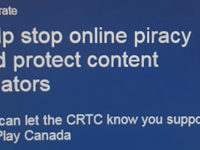A source has provided screen shots of internal Bell corporate correspondence encouraging employees to file interventions at the CRTC in support of its website blocking proposal. The effort to drum up support is not unique: ACTRA posted an advocacy page when the proposal launched complete with suggested language to use at the CRTC and OpenMedia has begun supporting Unfairplay.ca, which allows Canadians to learn more about the issue and make their voices heard. However, internal corporate messaging from Bell to its employees telling them “you can let the CRTC know you support FairPlay Canada” is likely to raise concerns Bell will participate in the CRTC process on its own behalf and provide behind-the-scenes encouragement to employees to add supportive interventions. In fact, iPhoneinCanada quickly ran a story on the issue calling the approach “disingenuous.”
Archive for February, 2018
The Case Against the Bell Coalition’s Website Blocking Plan, Part 6: Over-Blocking of Legitimate Websites
As the public concern over the Bell coalition website blocking plan continues to grow (both the Canadian Press and CBC this weekend covered the thousands of interventions at the CRTC), the case against the plan resumes with a review of why it is likely that it will lead to over-blocking of legitimate websites. Last week’s post highlighted the probable expansion of the scope of piracy for blocking purposes, a theme that continues today with a look at the many incidents over-blocking of legitimate sites sparked by website blocking (other posts in the series include the state of Canadian copyright, weak evidence on the state of Canadian piracy, the limited impact of piracy, and why the absence of a court order would place Canada at odds with virtually all its allies).
The danger of over-blocking legitimate websites raises serious freedom of expression concerns, particularly since experience suggests that over-blocking is a likely outcome of blocking systems. The Council of Europe Commissioner for Human Rights issued a report in 2014 on the rule of law on the Internet in the wider digital world, noting:
The Case Against the Bell Coalition’s Website Blocking Plan, Part 5: The Inevitable Expansion of the Block List Standard for “Piracy” Sites
The Bell coalition website blocking proposal downplays concerns about over-blocking that often accompanies site blocking regimes by arguing that it will be limited to “websites and services that are blatantly, overwhelmingly, or structurally engaged in piracy.” Having discussed piracy issues in Canada and how the absence of a court order makes the proposal an outlier with virtually every country that has permitted site blocking, the case against the website blocking plan now turns to the inevitability of over-blocking that comes from expanding the block list or from the technical realities of mandating site blocking across hundreds of ISPs for millions of subscribers. This post focuses on the likely expansion of the scope of piracy for the purposes of blocking and the forthcoming posts will discuss other sources of blocking over-reach.
The Case Against the Bell Coalition’s Website Blocking Plan, Part 4: Absence of Court Orders Would Put Canada At Odds With Almost Everyone
The first three posts in the case against the Bell coalition website plan focused on why it has failed to provide convincing evidence that the drastic step of site blocking is needed (existing law, weak evidence on Canadian piracy, limited negative impact on the market). The series continues by examining some of the problems with the proposal itself. One of the most obvious problems – indeed one that is fatal – is the absence of court orders for website blocking. The attempt to avoid direct court involvement in blocking decisions means the proposal suffers from an absence of full due process, raising a myriad of legal concerns. If adopted, the coalition website plan would put Canada at odds with almost every other country that has permitted blocking since the data is unequivocal: the overwhelming majority require a court order for site blocking.
The Case Against the Bell Coalition’s Website Blocking Plan, Part 3: Piracy Having Little Impact on Thriving Digital Services and TV Production
The case against the Bell coalition’s website blocking plan continues with an examination of the state of new digital business models and Canadian content production (earlier posts looked at Canadian copyright law and weak evidence on Canadian piracy). Given the high threshold needed to gain CRTC support for website blocking (which requires exceptional circumstances), the coalition proposal must not only make the case that there is a significant Canadian piracy problem, but also that piracy is having an enormous impact on the business and creative sectors.
The proposal tries to meet that standard by claiming that Canadian piracy “makes it difficult if not impossible to build the successful business models that will meet the evolving demands of Canadians, support Canadian content production, and contribute to the Canadian economy.” Yet as with the actual data on Canadian piracy, which firmly rebuts claims that Canada is a piracy haven, the Canadian data on the digital economy and Canadian creative sector show a thriving industry.











